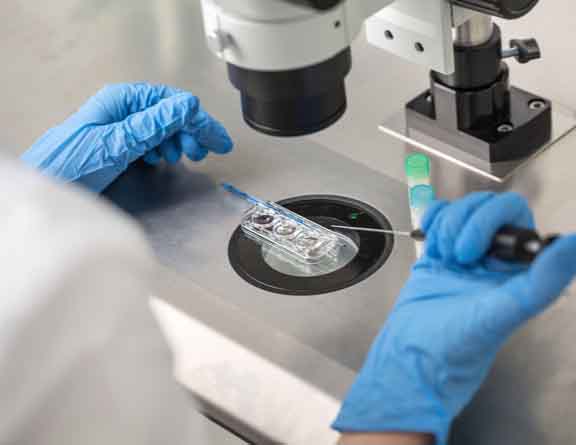
Amroha
100% Confidential Consultation
Top Fertility Specialists
Association With Advanced Labs
Home Sample Collection


IVF - Diagnosis and Procedure
The IVF specialist will conduct a complete diagnosis process to detect the cause of infertility in both partners. The OB-GYN will ask about your medical history and current medication if you are taking any. There are a few diagnostic tests the IVF specialist will recommend to assess the complexity before starting the IVF cycle:
IVF treatment is one of the most effective procedures to achieve fruitful results. The success rate is higher compared to other techniques. The process takes about a month or so to reach the last step of the treatment. IVF procedure is done in a proper sequential method which involves several steps-
Pregnancy happens if any of the embryos attach to the lining of your uterus.
Best IVF Centre in India with High Success Rate
We provide a free home sample collection facility to save patients from the hassle of commuting to the clinic/hospital. Our executives collect the samples for IVF from the patient’s doorstep, and the samples are preserved and deposited for testing/treatment with care.
We ensure 100% confidentiality of the patients throughout the treatment process. All the treatment details and documentation are kept secure, and no information, under any circumstance, is leaked to an outside party.
According to reports on the internet, there are more than 8 million babies around the globe who have been born as a result of a successful IVF.
The maximum price of IVF treatment in Amroha, can be as low as 1,00,000 INR and exceed 4,00,000 INR. Hence, the average cost of one cycle of IVF is around 2,50,000 INR. However, this should be considered only for reference purposes. The exact cost can vary depending on various factors. Therefore, speak to our medical coordinators directly regarding the cost.
Generally, IVF specialists ask infertile couples for consultation after one year of getting pregnant but are unable to do so.
Yes, you can use the donor egg or sperm as both are viable and you have undergone the appropriate procedures to prepare your uterus for transfer.
Yes, it’s essential to have sufficient eggs while you undergo the IVT treatment procedure, as there are chances that some eggs might not be mature enough to fertilize well normally. In addition, most eggs don’t turn into a live birth. Therefore, you may need to undergo another IVF cycle to get pregnant.
Unfortunately, most medical insurance plans do not offer coverage for assisted reproductive technologies such as IVF, IUI, etc.
One cycle of IVF treatment takes around two months. However, research suggests that women younger than 35 will get pregnant and have a baby with their first IVF egg retrieval and subsequent embryo transfer(s) about half the time.
Well-known celebrities like Shilpa Shetty, Karan Johar, Farha Khan, Shahrukh Khan have become proud parents of their little ones through IVF.
Possible complications of IVF treatment include the following:-
Apart from all those mentioned above, you may experience the following complications in rare cases:-
If you and your partner fail to conceive even after trying unprotected sex for one year, you should consider consulting an IVF doctor.
Following are the most common reasons to visit an IVF specialist:-
Apart from all the above, it’s crucial for both the partners to consult an IVF specialist for testing as the cause for a couple’s infertility can be due to either or both the partners.
Several factors determine the success rate of IVF treatment, such as:-
The success rate of IVF treatment in India ranges between 30% to 35% concerning the aforementioned factors. Therefore, in India, more and more people seek IVF treatment to conceive and enjoy parenthood.
.svg)
.svg)